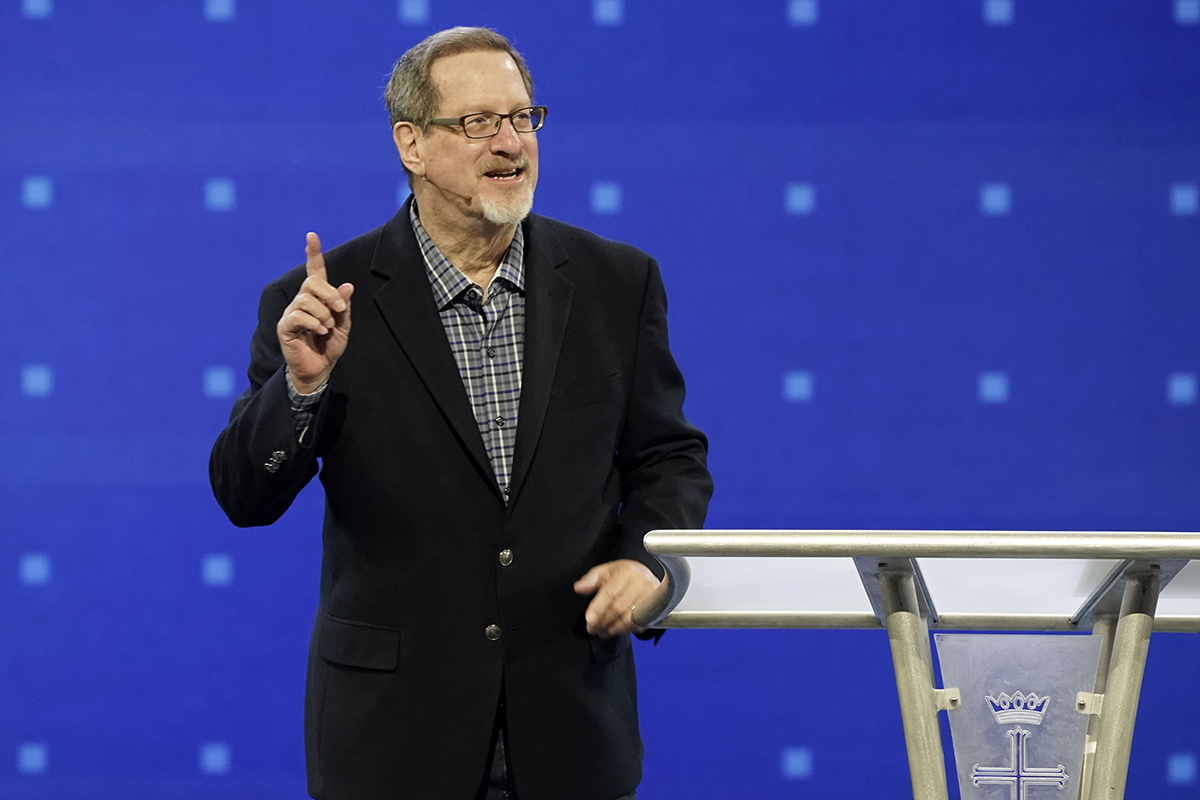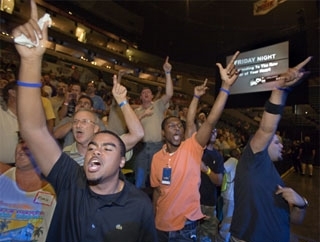Lee Strobel, William Lane Craig among speakers at Prestonwood apologetics conference

Students from more than a dozen schools in and around North Texas gathered this week at Prestonwood Baptist Church for what organizers are calling the nation’s “premiere” Christian worldview conference.
Hosted by Jeremiah J. Johnston, the dean of spiritual development at Prestonwood Christian Academy, and featuring a speaker lineup that included author Lee Strobel, Prestonwood Senior Pastor Jack Graham, and apologist William Lane Craig, the Biblical Worldview Conference is aimed at equipping believers to respond to mainstream cultural views with the truth of the Gospel.
While the conference has been an ongoing event since 2005 — including last year, which saw over 3,000 registrations both in-person and online — this year’s theme was focused on the character of Jesus as the great “I AM” of the Old Testament and “how to look like Jesus and act like Jesus in the increasingly complex world.”
Strobel, whose book The Case For Christ has sold more than 14 million copies, pointed the audience to two main findings of modern science that have led to the conclusion that God is, in fact, real.
First, said Strobel, is the study of the origin of the universe, known as cosmology, which, as science now overwhelmingly states, supports the idea of a universe that is not eternal, but rather one that began to exist at a point in the ancient past.
Even if one were to concede to the multiverse theory — which states that our universe is one of a near-infinite number of universes in existence — Strobel said this still suggests a beginning.
“Whatever begins to exist has a cause,” he said. “… We now know the universe began to exist, so it must have a cause.”
According to Strobel, there are two main challenges to the theory of special creation: the popular atheist’s question of “Then who created God?” and the theory advanced by the late astrophysicist Stephen Hawking, who suggested that because gravity exists, the universe can indeed create itself from nothing.
Both cases, said Strobel, fail to grapple with an ultimate “first cause,” one which must be transcendent, immaterial, eternal, powerful, personal, intelligent, creative and loving.
“If gravity caused [the universe], where did gravity come from?” he said. “You still need a Creator. Hawking’s theory fails to do away with God.”
The second finding of modern science that supports the existence of God, Strobel added, is the historical record of the resurrection of Jesus Christ, which he called the “lynchpin of our faith.”
He gave the audience four key terms to help summarize the evidence of the resurrection:
-
Execution: Jesus was truly dead after the Cross, a fact demonstrated even in texts from Josephus and other secular historians;
-
Early: within months of the crucifixion of Christ, we have early accounts of the subsequent resurrection of Jesus, most notably the Apostle Paul’s first letter to the church at Corinth, which was circulated during the lifetime of Jesus’ contemporaries, who could have easily contradicted these reports;
-
Empty: the tomb in which Jesus was buried is empty, a fact, Strobel said, which even His enemies admitted but pinned rather on the disciples’ alleged theft of the body, which Strobel called akin to saying “the dog ate my homework;”
-
Eyewitnesses: Jesus, said Strobel, appeared alive in a dozen different instances to more than 500 different people.
With these historical truths on our side, he added, Christians have no reason not to share Christ with everyone they know.
“There’s a world out there that needs to know this,” he said. “There’s a world out there dying who needs to know this.”
Tim Barnett, a Canadian adjunct Bible and science teacher and speaker for the Christian apologetics ministry Stand to Reason, expanded upon Strobel’s argument for the statistical impossibility of a finely-tuned universe by taking students to the words of Psalm 8: “When I see Your heavens, the work of Your fingers, The moon and the stars, which You have established, What is man that You remember him, And the son of man that You care for him?”
Covering the historical trends of long-standing theory of geocentrism to Copernicus’ introduction of heliocentrism in the 1500s, Barnett spoke on secular science’s “principle of mediocrity,” which essentially states that far from being God’s footstool, the Earth is hardly unique or special in any way.
In fact, said Barnett, some of the best evidence for a Maker is found in the reality of the universe’s fine tuning.
“In naturalism, if there is no Creator there is no Savior,” he said. “If there is no maker, then you’re just stardust … you have to create your own meaning, and that’s exhausting, by the way.
But it was Graham’s impassioned argument against the trend of “deconstruction” that provided what was perhaps the conference’s most visceral message.
Teaching out of John 6, Graham said the objective of every Christian is to “construct faith, not deconstruct.”
He pointed to Jesus’ challenge to the disciples after His “hard teaching” led many to “turn back and no longer follow Him.”
“They couldn’t take it and they left,” said Graham. “Whatever faith they had, they deconstructed it.”
The longtime Prestonwood pastor said the purpose of the conference was to not only deepen and develop their faith in Christ, but to “believe and be confident that God is a rewarder of those who diligently seek Him.”
“People are incurably religious, instinctively religious,” Graham said in regard to non-Christian faiths. “And many people who turn from Jesus Christ turn to other religions, false religions, in reality.
“… Buddha is still in the grave. Confucius is still in the grave. Muhammad is dead. And every founder of every major religion in the world no longer lives. Yet the claim of the Christian faith is, Jesus has the words of eternal life.”
Free Religious Freedom Updates
Join thousands of others to get the FREEDOM POST newsletter for free, sent twice a week from The Christian Post.




























![[Video] More – Aghogho » GospelHotspot](https://gospelhotspot.net/wp-content/uploads/2024/04/More-Aghogho.jpeg)
















